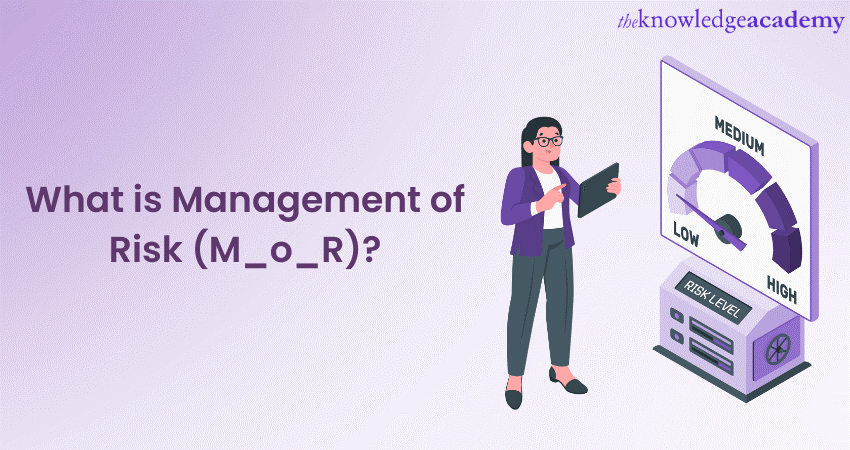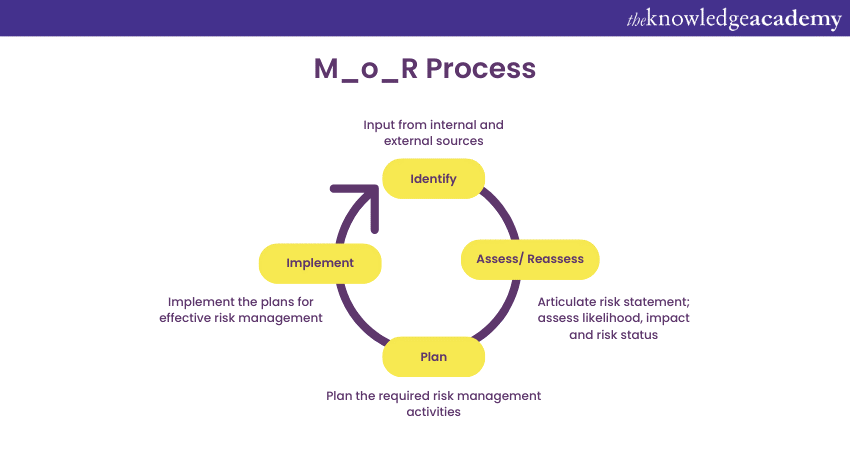We may not have the course you’re looking for. If you enquire or give us a call on +44 1344 203 999 and speak to our training experts, we may still be able to help with your training requirements.
Training Outcomes Within Your Budget!
We ensure quality, budget-alignment, and timely delivery by our expert instructors.

Management of Risk or M_o_R is a framework developed by Axelos, which aims at identifying, managing, and controlling potential risks that can affect the integrity of organisations on various levels. It is a beneficial investment for companies considering the vast number of risks businesses are prone to. The M_o_R framework is crucial and offers credible insights from the top career risk managers of the world.
Risk management has become essential to business operations, especially after the recent COVID-19 pandemic. Companies are shifting towards bringing about a digital transformation in their operations and mitigating their risks. According to PwC's Pulse Survey, 72% of risk executives believe that capitalising on digital transformation has been instrumental to the growth their company achieved in 2022.
Risks are an unavoidable factor for every decision made in the business. This calls for effective risk identification and management methods, which is where M_o_R comes in. Learn more about the systematic framework and processes under Management of Risk, M_o_R ®, to implement effective risk management.
Table of Contents
1) What is Management of Risk (M_o_R)?
a) M_o_R principles
b) What is the M_o_R approach?
c) M_o_R process
d) Implementation and monitoring of M_o_R
e) Benefits of M_o_R
2) Conclusion
What is Management of Risk (M_o_R)?
Management of Risk (M_o_R) can be understood with the M_o_R framework. One of the significant features of the framework is that it is all-encompassing. Its generic nature allows it to be used in various kinds of businesses. The framework relies on four primary concepts. Let's look at the four concepts in detail:
M_o_R Principles
The Management of Risk principles are integral in sustaining the quality of risk management processes. They benefit the framework because the practices that will ultimately help handle risks effectively will be sourced from it.
The principles are acquired from globally acknowledged statements that aid organisations in developing good risk management strategies for their internal controls. The corporate governance principles and the international standard for risk management ISO 31000:2009 are the two sources from which the M_o_R principles were derived.
Eight principles help in the development and implementation of sound risk management practices. Of the eight principles, the first seven are considered enablers, while the eighth is the outcome of an efficient risk management approach. The principles are:
a) It aligns with the objectives of the company
b) It fits the context of the organisation in a better manner
c) Keeps the stakeholders engaged
d) Offers clear guidance to the company
e) Aids informed decision-making
f) Facilitates continuous improvement
g) Focuses on creating a supportive culture
h) Achieves measurable value for the company
These principles form the basis for ensuring effective risk management. Their flexibility is beneficial as different organisations carry operations of varying sizes and capacities, leading companies to mould the principle to fit their objectives. M_o_R practitioner will effectively implement strategies to smoothen the working process.
Learn to assess and control risks efficiently by with MoR. Sign up for our MoR® Management of Risk courses now!
M_o_R Approach
Different organisations might approach the M_o_R principles in different ways. Since its principles are not set in stone, they can be tailored to your organisation's or industry's needs.
Once the principles are decided upon, the next step involves determining a specific approach towards the newly defined principles. The approach shall include a process guide and risk management strategies and also define the processes in its risk management policy.
The Management of Risk approach holds information regarding the methods organisations must adopt to practice risk management effectively. The policies and strategies associated with risk management and the procedures to implement them successfully can be accessed via documents like:
a) Risk management policy
b) Risk management process guide
c) Risk management strategies for every organisational activity
d) Risk register
e) Issue register
f) Risk improvement plan
g) Risk communications plan
h) Risk response plan
i) Risk progress report
Out of all nine documents, the first three explain the tasks that need to be taken up and the sequence in which they should be completed to implement quality risk management. They also specify the roles and responsibilities one has to perform in the M_o_R approach.
M_o_R process

The M_o_R process consists of four steps which showcase the inputs, outputs, tasks, and techniques that guarantee the efficiency of the risk management process. They also help track the extent to which the operations adhere to the principles. The four steps of the M_o_R process are:
1) Identify
2) Assess
3) Plan
4) Implement
Implementation and monitoring of M_o_R
After deciding on the approach and process of M_o_R, it must be implemented and monitored correctly as challenges due to management of Risk will arise and needs to be overcome. The extent of effort that is willing to be put in by organisations to maintain effective risk management is a testament to its core values and principles.
Having the spirit of risk management ingrained in the culture of organisations can significantly increase the company's credibility among the stakeholders. On the other hand, when the organisation takes a broken approach to risk management, it weakens its stature among the stakeholders.
Therefore, it is essential to advocate risk management through the company's values and keep assessing it at various stages to ensure proper implementation. There are specific methods that can help to confirm the effectiveness of the type of risk management deployed at your company, and health checks and maturity models are a few methods that can be used for this purpose.
Benefits of M_o_R
M_o_R has proven its mettle as a framework as multiple companies use it. GlaxoSmithKline and British Telecom are some of the companies that have reaped tons of benefits from this Axelos framework. The following are some benefits of using M_o_R for your business:
1) Helps in identifying potential risks and dealing with them to produce high-quality results
2) Chances for fraud are significantly reduced, thereby saving money
3) Improved contingency management
4) Acts as a roadmap with clear instructions for effective risk management
5) It prevents poor risk management, which saves time that would be spent on fixing unforeseen problems
6) Resources are used efficiently, guaranteeing minimal wastage
Gaining certification in M_o_R is a beneficial move for your career. You can be certified to identify, assess, and manage risks that threaten the integrity of organisations. Professions like Project Manager and Program Manager heavily benefit from this certification.
Conclusion
Management of Risk M_o_R is an instrumental Axelos framework that performs quality risk management by identifying, assessing, planning, and managing risks at all levels of organisations. Apart from implementing it in your organisation, earning a M_o_R certification is also beneficial. With this blog, we hope you understand what is Management of Risk (M_o_R) and how M_o_R works. This blog discussed the M_o_R principles, its approach, process and benefits. We also shed light on how a M_o_R certification can benefit your career.
Frequently Asked Questions
Upcoming Business Skills Resources Batches & Dates
Date
 MoR® 4 Practitioner Risk Management Certification
MoR® 4 Practitioner Risk Management Certification
Mon 20th Jan 2025
Mon 17th Mar 2025
Tue 22nd Apr 2025
Mon 19th May 2025
Mon 16th Jun 2025
Mon 21st Jul 2025
Mon 18th Aug 2025
Mon 15th Sep 2025
Mon 20th Oct 2025
Mon 17th Nov 2025
Mon 15th Dec 2025







 Top Rated Course
Top Rated Course



 If you wish to make any changes to your course, please
If you wish to make any changes to your course, please


